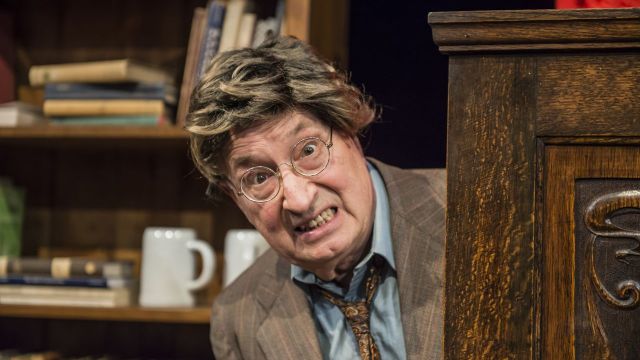No Man’s Land
When you have an experienced and knowledgeable director, together with a supremely talented cast, the difficult challenge of staging a Pinter play can turn into a triumph. The University of Adelaide Theatre Guild has all the elements just right with its superb production of Harold Pinter’s No Man’s Land.
Four men come together in an evocative room, full of the physical detail of a gentleman’s life- the books, paintings, photo albums, eclectic furniture, cluttered drinks cabinet and more. But beyond the objects in the room there is no veracity; no certainty. As the men joust with intricate, often amusing and sometimes confronting wordplay the so-called truths constantly change. Will the audience ever know the facts behind any of these men and their relationships with each other, or even how the protagonists really came to be there together? Throughout it all, a sense of menace is in the air and one wonders just what may soon be unleashed…and by whom…and why.
 Michael Baldwin is superb in his portrayal of the light-fingered, down on his luck yet perennially egotistical poet, Spooner, who has accepted an invitation by alcoholic upper-class Hirst to return to Hirst’s house for a drink after an apparent chance meeting on Hampstead Heath. Baldwin’s brilliant, multi-layered portrayal is both nuanced and physical, amusing yet tragic, as his character declines from a man wanting to please his host, one enjoying the repartee and reminiscences- mostly his own- to someone who begins to comprehend he’s entered a dark fantasy world where the players may be more than a match for him. The pathos in Baldwin’s performance is palpable.
Michael Baldwin is superb in his portrayal of the light-fingered, down on his luck yet perennially egotistical poet, Spooner, who has accepted an invitation by alcoholic upper-class Hirst to return to Hirst’s house for a drink after an apparent chance meeting on Hampstead Heath. Baldwin’s brilliant, multi-layered portrayal is both nuanced and physical, amusing yet tragic, as his character declines from a man wanting to please his host, one enjoying the repartee and reminiscences- mostly his own- to someone who begins to comprehend he’s entered a dark fantasy world where the players may be more than a match for him. The pathos in Baldwin’s performance is palpable.
Contrasting wonderfully with the verbose, restless Spooner, John Edge’s alcoholic Hirst is remote, terse and stiff, often with the air of a quietly amused predator watching prey. Beneath his only sometimes hospitable surface we are aware there’s much suppressed and what does flare to the surface is ambiguous. A fine performance, with one of many highlights being Hirst’s drunken exit to bed on his knees.

When the younger men enter the room the cat is well and truly amongst the pigeons. The play darkens and the audience’s confusion multiplies. Who are these two, really; are they Hirst’s employees or something much more intimate?
Foster bursts into the room like a peacock on steroids. Matt Houston plays Hirst’s companion/ housekeeper (or whatever he might be) with shrieking, high camp energy. At times this seems just a little too far over the top, but having said that, his performance is very effective and he contributes much to the sense of menace and even madness in the room.
Jonathan Pheasant is terrific as Hirst’s knowing and smilingly sinister butler/bodyguard, Briggs. He has wonderful stage presence and his comic timing is brilliant. A fantastic performance.
Diction for all four actors is exemplary.
Set design by Max Mastrosavas is brilliant. Dominated by ceiling to floor ruby red velvet curtains and original portraits of playwrights, it is perfect as a learned aristocrat’s cluttered study/library, full of the collected furniture and mementos of his real life.
 Sound design by Gavin O’Loghlen of Locrian Records is very fine, including the hugely atmospheric sound of footsteps that mark entries and exits to the unknown upper rooms of the house. Lighting and costume designs are also well done. Congratulations, too, to the local portrait artists.
Sound design by Gavin O’Loghlen of Locrian Records is very fine, including the hugely atmospheric sound of footsteps that mark entries and exits to the unknown upper rooms of the house. Lighting and costume designs are also well done. Congratulations, too, to the local portrait artists.
Some may find this play frustrating, because, typical of Pinter’s works, it’s more of a happening than a story that has a beginning, middle and end. Its lure is its capacity to intrigue and make each of us contemplate what the truths behind the odd foursome might be.
With its fine direction by Warwick Cooper, magnificent performances and wonderful staging, you would be mad to miss this Guild production.
Lesley Reed
Subscribe to our E-Newsletter, buy our latest print edition or find a Performing Arts book at Book Nook.

